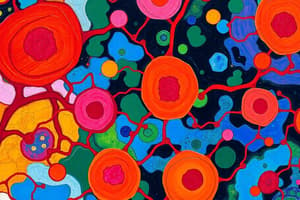Podcast
Questions and Answers
What are the 3 broad classes of T cells?
What are the 3 broad classes of T cells?
- Memory T cells
- Helper T cells (correct)
- Cytotoxic T cells (correct)
- Regulatory T cells (correct)
How many antigen binding sites does a T-cell receptor have?
How many antigen binding sites does a T-cell receptor have?
One
How many hypervariable regions make up the antigen binding site of a T-cell receptor?
How many hypervariable regions make up the antigen binding site of a T-cell receptor?
Six
What is the function of the T cell receptor constant regions?
What is the function of the T cell receptor constant regions?
What processes are responsible for generating T cell receptor diversity?
What processes are responsible for generating T cell receptor diversity?
What gene segments make up the α-chain variable region?
What gene segments make up the α-chain variable region?
What type of antigen do T cells recognize?
What type of antigen do T cells recognize?
What is the functional difference between MHC class I and MHC class II molecules?
What is the functional difference between MHC class I and MHC class II molecules?
Which cell types express MHC class I molecules?
Which cell types express MHC class I molecules?
Which T cell co-receptor binds to MHC class I?
Which T cell co-receptor binds to MHC class I?
What is cross-presentation?
What is cross-presentation?
How many different class I and II molecules does each person have for presenting antigens?
How many different class I and II molecules does each person have for presenting antigens?
What does polymorphic mean in the context of MHC genes?
What does polymorphic mean in the context of MHC genes?
Why is it beneficial to have a large number of different MHC alleles?
Why is it beneficial to have a large number of different MHC alleles?
How do only 12 MHC molecules in each person present such a broad range of antigens?
How do only 12 MHC molecules in each person present such a broad range of antigens?
What is the peptide binding motif?
What is the peptide binding motif?
What is MHC restriction?
What is MHC restriction?
Flashcards are hidden until you start studying
Study Notes
T Cell Classes
- Cytotoxic T cells are classified as CD8 T cells.
- Helper T cells and Regulatory T cells are classified as CD4 T cells.
T Cell Receptor Components
- T cell receptors (TCRs) feature one antigen binding site formed by variable regions of α and β chains.
- The antigen binding site comprises 6 hypervariable regions—3 in the α chain and 3 in the β chain.
T Cell Receptor Structure
- Constant regions of TCRs provide structural support and anchor the receptor to the membrane.
- T cell receptor diversity arises from somatic recombination, junctional diversity, and random α/β chain pairing.
Gene Segments in T Cell Receptors
- The α-chain variable region is formed from V and J gene segments.
- The β-chain variable region consists of V, D, and J gene segments.
- Constant regions of TCRs are not composed of gene segments.
Antigen Recognition
- T cells specifically recognize peptide antigens that are presented on MHC molecules.
MHC Molecules
- MHC class I molecules present antigens from cytosolic sources to CD8 T cells.
- MHC class II molecules present antigens from extracellular sources to CD4 T cells.
Expression of MHC Molecules
- Almost all body cells express MHC class I molecules, enabling them to present antigens to CD8 T cells.
- Only antigen-presenting cells (APCs), like dendritic cells, macrophages, and B cells, express MHC class II molecules.
T Cell Co-receptors
- CD8 co-receptor binds to MHC class I molecules.
- CD4 co-receptor binds to MHC class II molecules.
Cross-Presentation
- Cross-presentation occurs in dendritic cells when they present extracellular antigen on MHC class I to activate CD8 T cells, despite not being infected by that antigen.
MHC Molecule Variability
- Each individual has 6 MHC class I and 6 MHC class II molecules, originating from both parents.
- MHC genes are highly polymorphic, having numerous alleles across the population.
Importance of MHC Polymorphism
- A diverse range of MHC alleles enhances the population's ability to present a wide array of antigens, addressing emerging pathogens and diseases.
MHC Binding Specificity
- MHC molecules exhibit promiscuous binding specificity, allowing them to present a broad spectrum of peptide antigens.
- The peptide binding motif, defined by specific anchor residues, determines which antigens a particular MHC molecule can bind.
Definition of MHC Restriction
- MHC restriction refers to the specificity of T cell receptors for both antigens and the corresponding MHC molecule necessary for recognition.
Studying That Suits You
Use AI to generate personalized quizzes and flashcards to suit your learning preferences.





